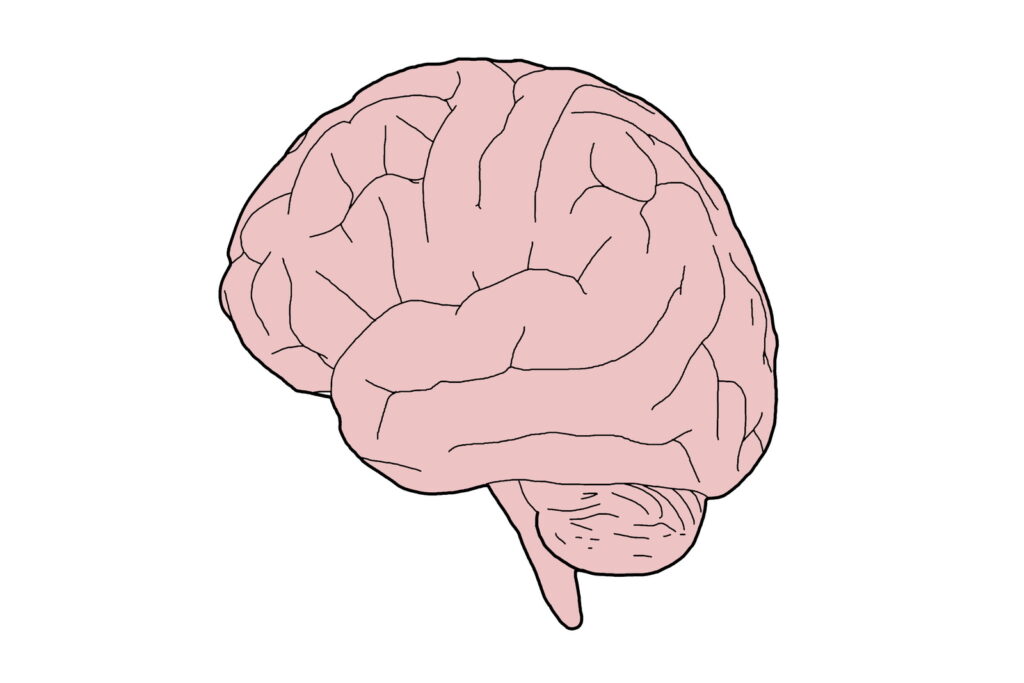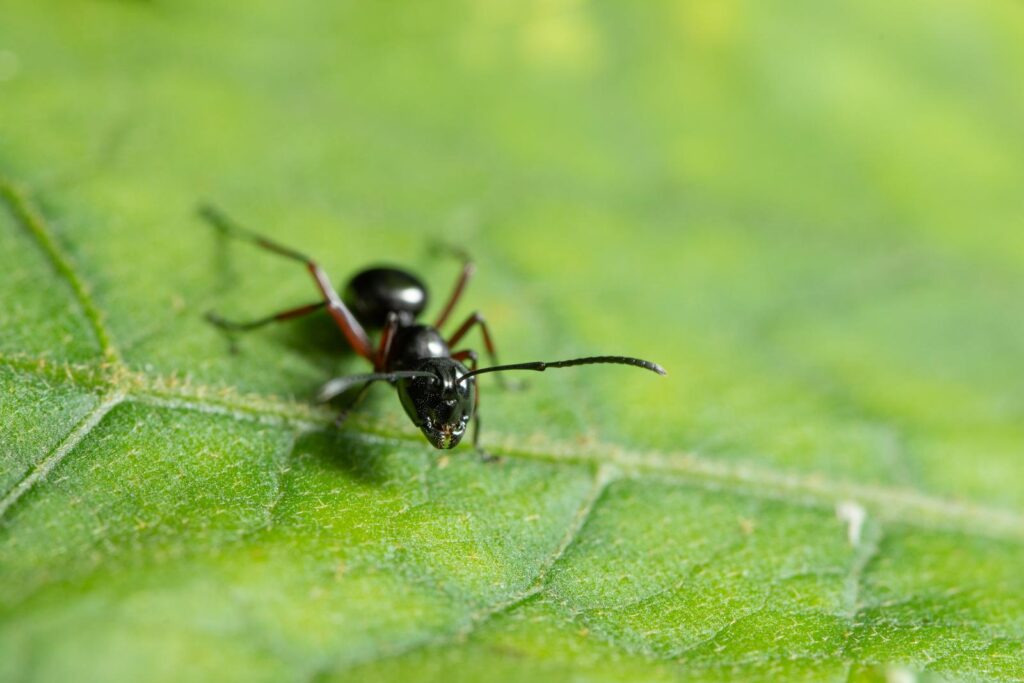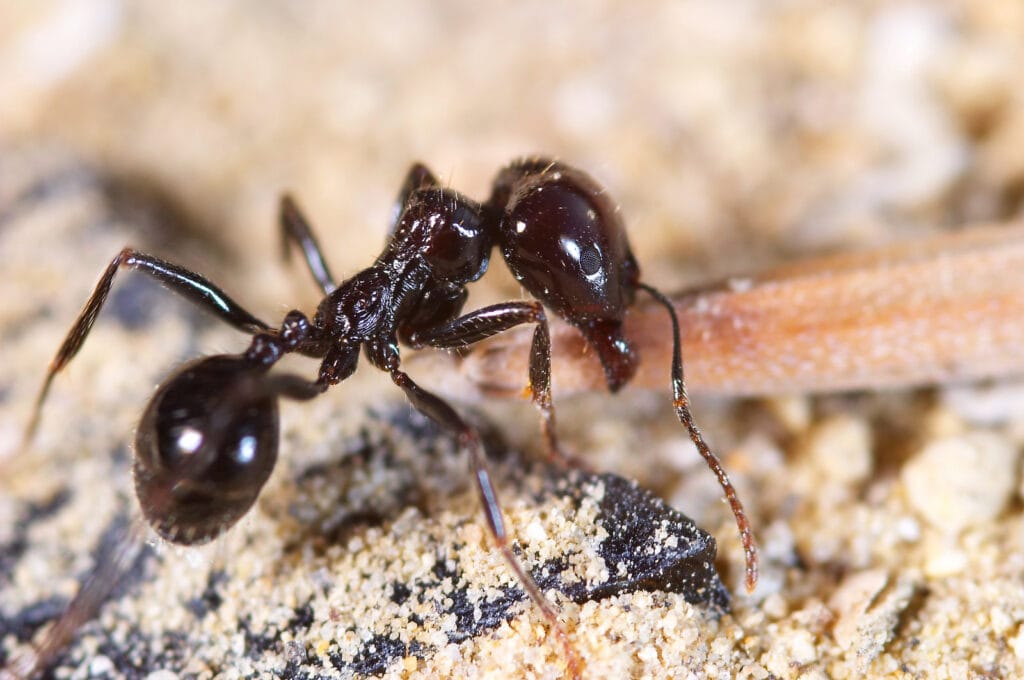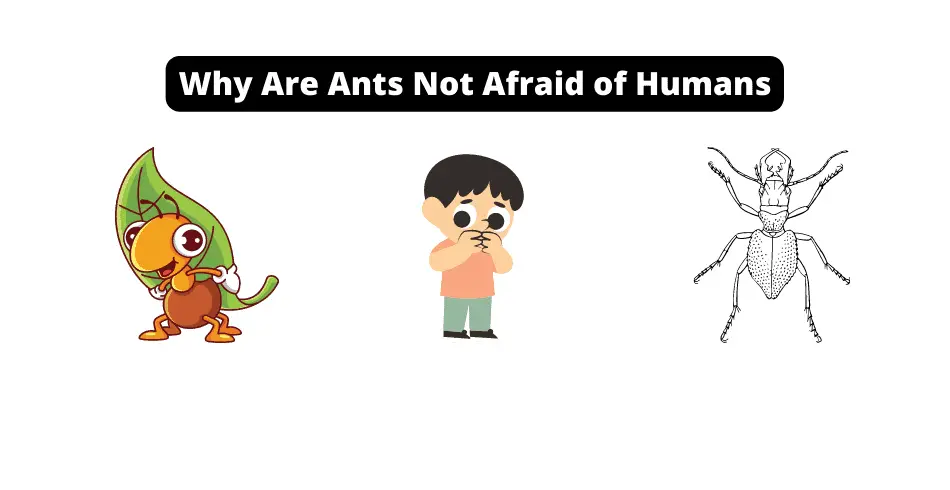Ants are not afraid of humans because they lack complex emotions such as love and hate.
This has to do with biology, where their brains cannot process, store and associate objects with expected outcomes.
In other words, based on experience and learning, when we humans see, say, a lion, we get scared.
In contrast, ants are structurally and emotionally unable to accomplish such complex associations.
That’s why ants are not afraid of humans and have no reason to be in normal circumstances.
However, when ants encounter human activity, they interpret intrusive and react in fear for their safety.
To understand these two scenarios, we need to define “fear” or what being “afraid” means.
Don’t worry, we’ll break it down below.

What is fear, and do ants feel fear?
Fear is one of the seven universal emotions experienced by human beings and many other organisms.
In its simplest form, fear is a reaction to anything humans and many creatures perceive or judge as threatening to their well-being.
Essentially, fear is the sense of being afraid when a creature’s safety is threatened.
Humans are at the top of the animal kingdom; our brains can reason and define intangible things or experiences.

For this reason, we expect other creatures we coexist with to react to various stimuli or triggers the same way humans behave.
This idea, even though true with some animals like dogs, doesn’t apply to many other creatures like ants.
So, do ants feel fear?
Yes, they do.
Ants will respond to any trigger they interpret as threatening their well-being or existence to secure their spaces and safety.
In such circumstances, we can conclude ants feel fear.
References:
https://www.ncbi.nlm.nih.gov/pmc/articles/PMC3595162/
https://www.paulekman.com/universal-emotions/what-is-fear/
https://dictionary.apa.org/fear
Do Ants See Humans As A Threat?
In ordinary circumstances, ants won’t even notice your existence.
Even though they have eyes, they only see objects from blurry perspectives and cannot differentiate them based on their unique features.
In the daily functioning of the ecosystem, all animals and insects in the universe instinctively go about their lives.
We, humans, have found an evolutionary working balance with other creatures.
However, humans learn and store experiences, good and bad, about our interactions with other organisms around us.
Human knowledge that ants spread diseases or that some species of ants, like fire ants, bite make us scared of ants.
Not only that, the fact that we can quickly kill ants would logically mean ants have learned to be scared of us.
Again, this way of thinking arises from the fact that we assume animals or insects react logically to the sight of humans the way we humans have learned to do when we see organisms we consider dangerous.

In the ordinary course of things, ants will walk around your presence and not see you as a threat.
References:
https://royalsocietypublishing.org/doi/10.1098/rsos.190778
When are ants afraid of humans?
Simple!
Ants get afraid of humans when they encounter any human activity that interrupts their routine activities or threatens their existence.
The reaction is not because they know it’s a human being involved; they instinctively react to protect themselves.
In those moments, they interpret human activity as unpleasant, the same way they would respond to any other non-human threat.
Any human activity, such as digging up a nest, getting in the way of an ant trail, or accidentally entering the ant’s territory, are things the ant interprets as threats and causes phobia.

How do ants react when they’re afraid?
When an individual ant identifies a threat, it will crawl or run away.
When a threat is identified inside a colony, the ants don’t run.
If the threat endangers the colony, ants will run to the nest to recruit others.
They recruit others by emitting an odor that informs nestmates of imminent danger.
They depend on the antenna to detect the presence of an intruder or a threat.
The ants use the antennae as odor receptors to find food and pick enemy odors.
When a perceived enemy invades a colony or nest, the ants that identify the threat send alarm pheromones to other ants.

Ants are social insects. When guarding their territory, they have a hive mind and thus collectively protect their habitat.
More than anything else, they fiercely defend the queen against any threat.
The ant’s reaction to a perceived human threat depends on the ant species.
Some produce a rattling sound to warn the enemy before they attack, and others emit an odor also to warn the perceived enemy.
The ants with a stinger will sting and inject chemical poison. Some stingerless ant types bite.
The ants rapidly and frantically evacuate the nest if the perceived threat is indefensible.
They hurriedly identify safer locations where they move the queen and the entire brood.
Essentially, ants defend themselves from human interference and other threats, such as animals or pets crossing their routine paths.
Other than humans, what else are ants afraid of?
Ants are naturally afraid of predators.
In the same way, humans are afraid of hazardous ants; ants also fear organisms that prey on them.
These include other ants from rival ant colonies and ant-eating predators such as spiders, birds, or ant-eating lizards.
And, of course, Ant Eaters!

Final Thoughts, are ants afraid of humans?
Ants have low-vision eyes. Their brains are not highly developed, and their tiny brains are incapable of making associations like human brains.
So, they treat humans as any other object they encounter during their routine activities.
Ants do not have sensory nerves like humans, nor do they have emotions.
Fear, defined in simple terms, is the reaction of creatures when encountering threatening objects or situations.
Similar to humans, some animals fight, and others run when they feel threatened.
The same applies to ants.
As long as a human being does not do anything that threatens the ant’s well-being, the ants have no conscious ability to be afraid of humans.
In other words, they don’t get scared of humans.
However, if an encounter with a human is perceived as a threat, the ants run frantically in fear to safeguard their interests.
Some, like fire ants, will bite or sting, and others will evacuate the brood to safer locations.
Ants have no reason to be afraid of humans unless human action threatens their existence.

